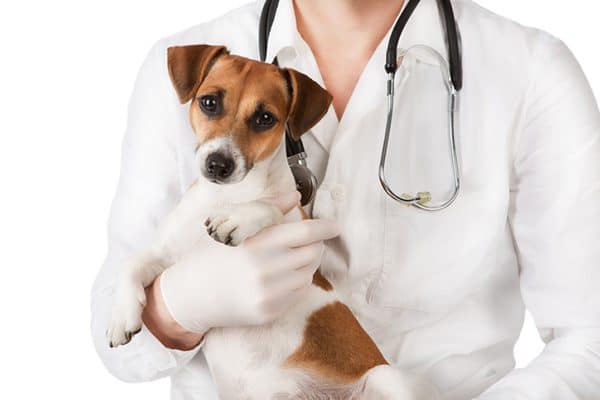It’s night or the weekend and your vet clinic is closed. Emergency strikes, what do you do? Sometimes it’s hard to determine if your pup’s medical condition can wait until your regular vet clinic is open, or if you should hightail it to an emergency vet. Here’s when to head to the emergency vet or other urgent caregiver and how to find a 24-hour or emergency vet if you don’t already have one:

Do you have an emergency vet on call if your dog has an accident? Photography by Fly_dragonfly/Thinkstock.
Difficulty breathing
Your dog’s gums should be a pink hue. If they are blue, red or gray, it could indicate trouble with oxygenation, blood flow or internal bleeding. Although dogs pant, excessive panting is a concern, as is coughing up pink, frothy liquid.
Repeated vomiting and/or diarrhea
Although dogs may have a single incident of vomiting or diarrhea, repeated episodes — especially ones that involve blood — require an emergency vet or other immediate medical care. These may be symptoms of an intestinal blockage or ingestion of toxins. Additionally, excessive vomiting and diarrhea can quickly result in dehydration. If you have questions about toxic substances and their effect on dogs, contact ASPCA Poison Control. Some common toxins include medication (prescription and over the counter — OTC), chocolate (particularly dark chocolate), grapes/raisins (along with some other human foods), cleaning products, insecticides and rodenticides and gardening products.
Distended or bloated abdomen
Gastric dilatation and volvulus (GDV) or “bloat” can be an extremely serious health concern for dogs. An accumulation of gas can sometimes cause the stomach to rotate or twist. The stomach then puts pressure on large arteries and veins, restricting blood flow. This can quickly turn into a deadly situation. A distended abdomen is certainly a symptom, but a dog might also exhibit signs of restlessness and excessive panting. Take any concern of bloat seriously and immediately take your dog to an emergency vet.
Trauma
Trauma warrants an examination, even if your dog appears unharmed. Trauma can occur after a fall from an elevated location, being hit by a vehicle, being attacked by another animal — or any other type of accident. A dog could emerge from such a situation with lacerations, broken bones, internal injuries, blood loss, shock or more. Seek care immediately.
Foreign body ingestion
Dogs are known to be not-so-discriminating in what they eat, and this puts them at risk of intestinal blockage. If you suspect your dog has eaten a foreign object, look for symptoms like vomiting, sluggishness and weight loss. Then, get him to an emergency vet fast.
Seizures
Canine seizures can be triggered by liver disease, kidney disease, electrolyte problems, head injury, brain cancer and encephalitis. Any episodes of this abnormal brain activity should be reported to a medical professional.
Difficulty urinating
If your dog strains to urinate, it could indicate a urinary tract infection — or something more serious. Difficulty urinating could be caused by stones or crystals in the bladder, inflammation, trauma, prostate disease, cancer or even stress. Urination issues should not be ignored. Take your dog an emergency vet immediately.
Not eating or drinking
If your dog goes a full day without eating or drinking, it’s time to contact a veterinary professional. The symptoms could indicate pickiness around food or behavioral issues, but they could also point to systemic diseases and infections, dental problems or stress.
How to find help for an emergency situation
At your regular vet visits, ask a professional if the clinic offers 24/7 emergency care — and if not, ask for a recommendation. Always have a dog first aid kit handy and keep your vet clinic’s number, as well as the emergency facility’s information, in your phone or wallet and in a visible location within your home. If the emergency clinic is not in an area with which you’re familiar, make a test run so you’re not concerned about directions during an actual emergency.
It’s a good idea to plan beforehand, but accidents do happen. If you find yourself dealing with a dog accident, Google “24 hour vet near me” or “emergency vet near me” and allow Google to use your location for the most accurate results.
ASPCA’s Animal Poison Control Center Phone Number (888-426-4435) or the Pet Poison Helpline (855-764-7661) are open 24 hours, 7 days a week, 365 days a year and helpful if your dog ingests something potentially harmful — but we still suggest taking him to the vet as soon as possible.
You know your dog’s habits and behaviors better than anyone, so if you notice any symptoms that may be emergency situations, don’t delay — call your vet or head to the nearest emergency clinic.
Thumbnail: Photography by absolutimages/Thinkstock.
Read more about dog emergencies on Dogster.com:
- When to Take Your Dog to the Vet Immediately
- How a Canine CPR and First Aid Class Has Prepared Me for Dog Emergencies
- We Go Behind the Scenes at an Emergency Vet Hospital
The post When Should You Call an Emergency Vet and How Do You Find One? appeared first on Dogster.
No comments:
Post a Comment